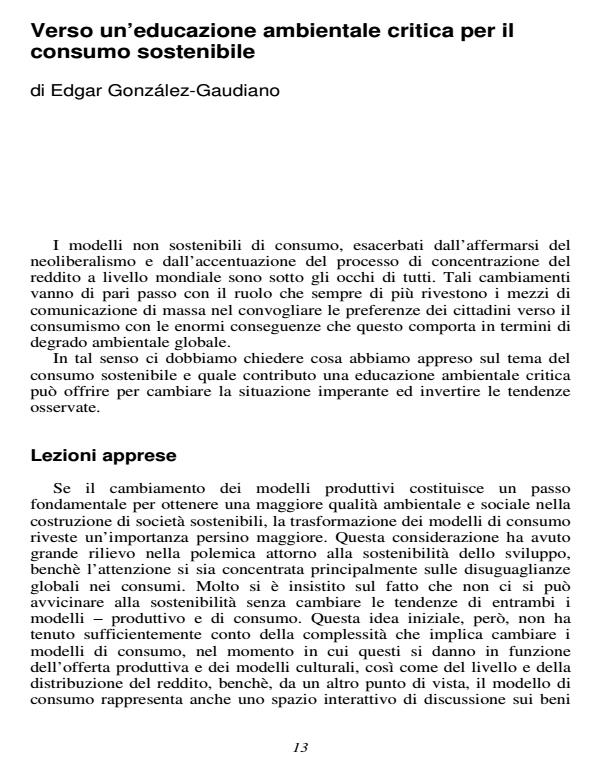Verso un’educazione ambientale critica per il consumo sostenibile
Titolo Rivista CULTURE DELLA SOSTENIBILITA '
Autori/Curatori Edgar González-Gaudiano
Anno di pubblicazione 2008 Fascicolo 2007/2
Lingua Italiano Numero pagine 9 P. 13-21 Dimensione file 95 KB
DOI
Il DOI è il codice a barre della proprietà intellettuale: per saperne di più
clicca qui
Qui sotto puoi vedere in anteprima la prima pagina di questo articolo.
Se questo articolo ti interessa, lo puoi acquistare (e scaricare in formato pdf) seguendo le facili indicazioni per acquistare il download credit. Acquista Download Credits per scaricare questo Articolo in formato PDF

FrancoAngeli è membro della Publishers International Linking Association, Inc (PILA)associazione indipendente e non profit per facilitare (attraverso i servizi tecnologici implementati da CrossRef.org) l’accesso degli studiosi ai contenuti digitali nelle pubblicazioni professionali e scientifiche
The article underlines the evident link between the present consumption model and environmental degradation, and invites us to work towards sustainable consumption. This means re enforcing all of the practices orientated towards the substitution or minimisation of consumption of goods that are deemed critical from the environmental point of view, and encourage a different rational to spread a consumption model that considers the quality of the product and the conditions of its production distinguishing necessity from desire. A consumption model that contributes to the promotion of greater social equality and less environmental stress, through educational processes that stimulate critical thought at the moment of choice between various options, avoiding choosing those that are promoted as status symbols. Environmental education for sustainable consumption must also take into consideration products offered from companies or countries that promote superfluous or extravagant consumption, that use child labour and slaves, that do not adopt measures for environmental protection through emissions and waste control, that are not eco-efficient, that do not protect their workers from risks at work, that pay poor salaries or receive tax exemptions, special subsidies or preferential treatment that creates an unfair advantage over other countries. In the same way, education for sustainable consumption must raise attention to publicity campaigns, in a context in which the target population is seen as a passive client and vehicle to globalise the material ways of life of the North Western countries. School on its own however cannot reach the results that are urgently needed: it is necessary to fight on a broader front, that involves key social actors and to be aware that we are fighting a long battle.
Edgar González-Gaudiano, Verso un’educazione ambientale critica per il consumo sostenibile in "CULTURE DELLA SOSTENIBILITA '" 2/2007, pp 13-21, DOI: